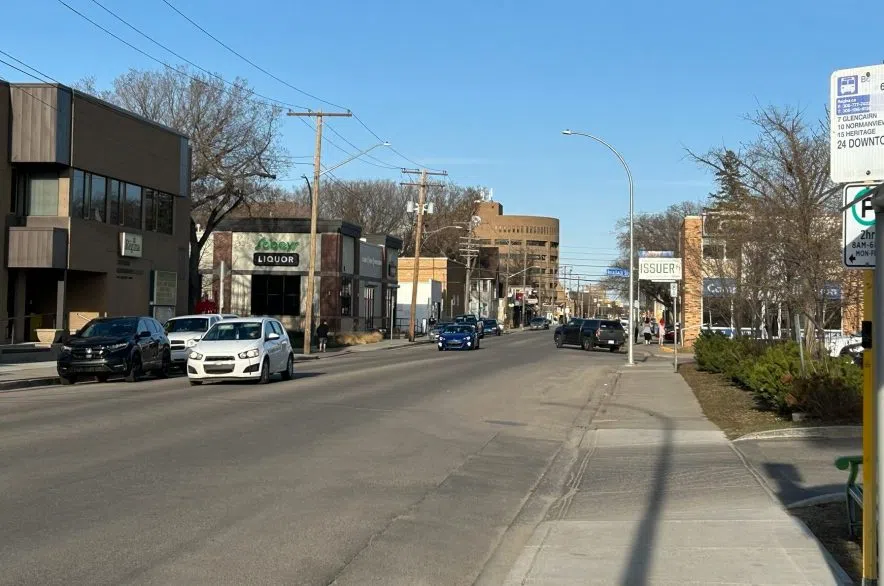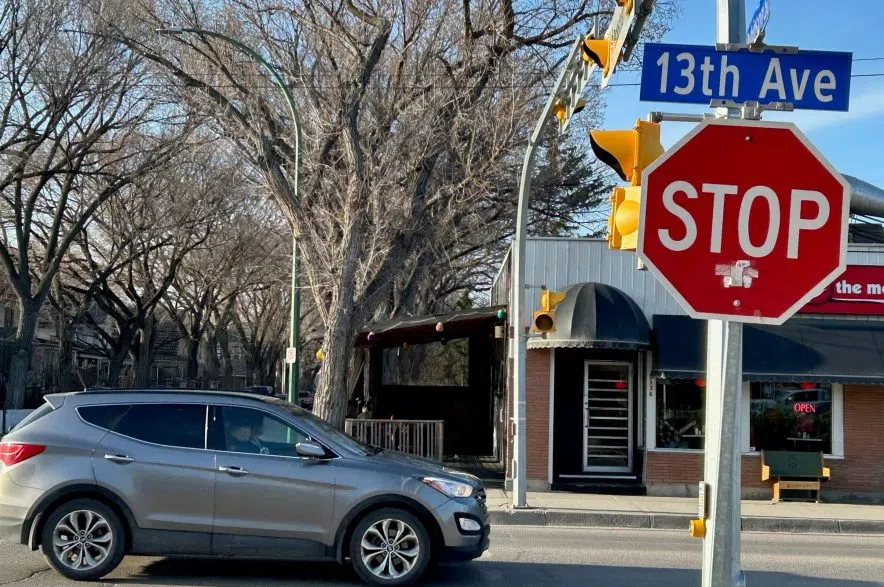Vision Zero met a bit of a roadblock at Regina City Hall on Wednesday.
City council was taking a look at implementing the Vision Zero Road Safety Framework, which included dropping the speed limit in the Cathedral neighbourhood to 30 kilometres per hour.
The city calls Vision Zero a data-driven framework designed for all road users (pedestrians, drivers cyclists etc.) that would be implemented over the next five years.
After several hours of deliberation on Wednesday, council decided to table the decision until the May 8 city council meeting.
The motion to delay the vote passed 6-5.
The matter was originally supposed to be discussed on April 10, before being pushed back to Wednesday.
“I think you saw was a little bit of concession to get something passed,” Mayor Sandra Masters told reporters after the meeting.
Masters said she thinks council agrees with the Vision Zero framework itself, but there was an absence of some of the “best practices” from a data perspective, which led to confusion and disagreement during the meeting.

The speed limit along 13th Avenue could be reduced if the Vision Zero framework passes. (Scott Vickers/980 CJME)
City administration said council hired a consultant for the plan two years ago.
“After learning at the executive committee meeting that the decrease in speed limit to 30 kilometres per hour will add only an additional 77 seconds to someone’s commute driving west to east or vice versa, it’s clear that drivers have little to lose in the adoption of the Safety Zone,” Dr. Vanessa Mathews, a professor of environmental and geography and environmental studies at the University of Regina, said when she spoke as a delegate Wednesday.
“I would personally welcome any inconvenience that can save lives and create a vibrant community space.”
Several members of the community have raised concerns after the death of 16-year-old Dendrae Thunder Lonechild in April of 2023.
Lonechild was hit and killed by a vehicle in the area of 13th Avenue and Garnet Street.
According to Regina police, 660 tickets for traffic-related offences were issued in the Cathedral area in 2023, up from 428 and 495 in 2021 and 2022 respectively.
Regina police also say they received 143 calls about collisions and hit-and-runs in 2023, up from 139 in 2022 and 117 in 2021.
Jonathan Lorenc with the Cathedral Village Community Association said the organization supports Vision Zero as a means of making the neighbourhood safer.
“If there is a long outstanding issue that affects the entire neighbourhood, it is high-speed traffic,” Lorenc said.
Lorenc called 13th Avenue a community street with many amenities. He said it has around 40 businesses, in addition to several schools, parks and churches – including the one where Cathedral gets its name.
It is also the home of the annual Cathedral Folk Festival.
“These amenities attract pedestrian traffic and contribute to the beauty and vibrancy of our neighbourhood and for that vibrancy to continue sustainably, residents must feel safe and comfortable enjoying those amenities,” he said.
Confusion at council
Regina’s executive committee had previously voted 7-3 in favour of establishing the city’s first Community Safety Zone back in March.
But what seemed like a straightforward process turned out to be a much more complicated venture.
At one point, Coun. Jason Mancinelli suggested that Pasqua Street, Victoria Avenue, Elphinstone Street and 15th Avenue remain at their current speed limits of 50 km/h.
Mancinelli said the Vision Zero report doesn’t contain any stats about where the biggest traffic accidents happen.
Shortly after that, Coun. Andrew Stevens asked for a motion to get a report from city administration on what the effects would be of whatever version of the plan was passed in the second quarter of 2026.
That motion was approved 8-1 with only Coun. Bob Hawkins voting against. Coun. Terina Nelson was away.
“This 30 km/h zone and what we’re proposing and the discussions that have happened with the community and the city are important,” Stevens said.
“There’s a lot that we could learn from this and then start applying to other parts of Regina where residents or the community or the local road conditions demand.”
Later on, Coun. John Findura successfully motioned for the speed limit reduction to go from 30 km/h to 40 km/h.
It initially passed 6-5, but council later voted to reconsider it in a 7-4 vote.
Council unanimously passed the first three points of the Vision Zero framework – which were about endorsing the strategy in the city, getting administration to publish a 2024 to 2028 framework and also have administration bring forward any future budget implications.
The fourth point was on the speed limit change itself and was voted on separately.
It was defeated 6-5, with Hawkins, Findura, Stevens, Masters and Coun. Landon Mohl voting in favour, while councillors Nelson, Lori Bresciani, Dan LeBlanc, Cheryl Stadnichuk and Shanon Zachidniak voting against.
However, Mancinelli asked for a revote because he meant to vote in favour. It lost again 6-5 with Stevens voting against it this time.
Hawkins said that in light of confusion on council, the decision should be tabled to a later date which he said would provide an opportunity for second thought.
Vision Zero was first implemented in Sweden in 1997 and has since gained momentum across Europe.
According to research presented by the City of Regina, a person hit by a vehicle moving at 30 km/h has a 60 per cent chance of survival compared to vehicle moving at 40 km/h, which carries a 20 per cent chance of survival.
Accessibility
City council unanimously passed the Regina Accessibility Plan, which Masters called comprehensive.
Masters said it was imperative to put the concerns of the community into action.
“I will tell you that the Accessibility Advisory Committee that’s been in place for the last number of years is exceptional,” she said.
“They go out into the broader community as well as continually advise on accessibility issues. We also have a seniors’ advisory committee and they come back with similar things that have to do with ice and sidewalk repairs and what makes it more accessible for seniors as well.”
Masters said council will expect budget asks when it comes to accessibility spending and said it is good to have a plan on understanding how to allocate funds.
Masters also stated that with the exception of the high waterslide, Wascana Pool is the most accessible pool in the country.
Housing
City council unanimously passed further advancements to the Housing Accelerator Fund (HAF) program.
This time it was Phase 2. Part 1 of the program is concerned with proposed intensification areas along transit routes.
Regina is changing zoning bylaws to be eligible for $35 million in federal funding.
Once again, many delegates arrived to voice their opposition to the program.
“I think sometimes it’s just the fear of the unknown,” Masters said about the opposition.
“I hear the (notion) of bringing folks along. I think that’s important but we also know that it was called the accelerator fund with intention and we have a very narrow window — not just to approve the changes but to actually execute on having an additional 1,100 units into market within 36 months.”
Masters said the city is trying to achieve that via permitting, infrastructure studies, bylaw changes and investing to make rapid changes.











